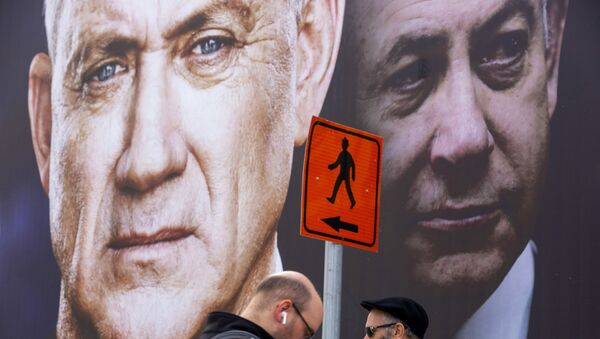Israeli President Reuven Rivlin has decided not to extend the mandate given to the head of the Blue and White Alliance, Benny Gantz, that was due to expire at midnight.
The move follows Gantz's failed attempt to form a coalition and after talks with Prime Minister Benjamin Netanyahu over unity hit a dead end.
Gantz has a day left to solve the country's political crisis and strike a deal with the PM. If he fails, the mandate will go back to the Israeli parliament, the Knesset, which will need to put forward a candidate able to provide the 61 signatures needed to form a government.
And the Mandate Goes to...
The catch is that the Knesset doesn't have one. The only person who even comes close to having the necessary amount of signatures is Netanyahu, and the religious bloc in the parliament has already appealed to the head of state, urging Rivlin to give "Bibi" a chance.
"We, the heads of factions and parties, call on you to pass the mandate to prime minister Benjamin Netanyahu as he possesses 59 signatories... just as you did after the election campaign in September when you gave the mandate to Benny Gantz, who back then had only obtained 54 signatures", the request read.
The possibility that the president might end up doing so has already caused an uproar among some elements of the Israeli public.
On Sunday, a group of 117 high-tech executives, leading academics, and former security people appealed to Israel's High Court of Justice in a bid to prevent Netanyahu from receiving the mandate given his graft probes. The latter include buying positive coverage and receiving illegal gifts from a rich donor, allegations that Netanyahu denies.
The court has dismissed the appeal, just as it did earlier when similar demands were submitted, fearing such blunt interference would damage its already marred reputation.
With the obstacle of the High Court eliminated, there is really nothing in the way of Netanyahu obtaining the mandate except legislation that could bar a person with corruption charging from putting forward their candidacy for the top job.
Gantz, who is now the chairman of the Knesset, might initiate such a move but for it to pass he will need the support of more than 61 MK's and doubts run high as to whether he will be able to secure these votes, especially given that there are voices within his own party who are supportive of Netanyahu.
Netanyahu to Benefit From All Scenarios?
Netanyahu, meanwhile, is waiting. He's not made any moves apart from a Sunday call to Gantz urging him to start a round of talks to cement the formation of their coalition.
The current situation is profitable for the prime minister. If the mandate is given to him, he will try to make it work. No guarantees are given but today, more than ever before, he has better odds of making it work.
Now with the Blue and White split and some members of Gantz's party tilting towards Netanyahu, it will be easier for the PM to collect the three signatures he needed to be given the keys to the top job.
But even if he is not given the mandate and Israel goes to the polls again, for the fourth time in two years, he still has better odds than any other candidate of receiving a majority of votes.
Firstly, gone is his main rival, the Blue and White party, who for the past two and a half years has managed to challenge Netanyahu. Since the split from his partners, who were reluctant to sit down with the PM, Gantz has suffered a drop in ratings, with a recent poll suggesting that if elections were held today his party would only get 18 seats in Israel's 120-seat parliament (versus the 33 he got in the recent round).
Secondly, gone is the threat of the Labour Party whose head is reportedly considering coalition talks with Netanyahu, despite his previous promises to refrain from working with the PM.
According to the same poll, a fourth round of elections, would see Labour get fewer than four seats, meaning it would not pass the threshold needed to enter Israel's parliament, a major blow to the party that established the State of Israel in 1948.
And, finally, Netanyahu, now enjoys greater public support due to the way he is handling the coronavirus crisis which has claimed the lives of more than one hundred Israelis.
A recent Maariv study revealed that some 70 percent were happy with the performance of the country's PM and as polls seem to be in his favour Netanyahu has fewer fears of entering another endeavour that would cost Israelis some $800 million.


